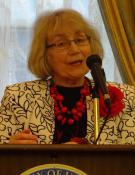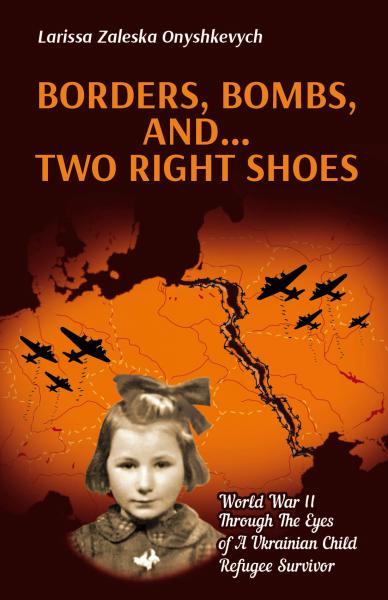Larissa Zaleska Onyshkevych

Education: B.A., University of Toronto; M.A., University of Pennsylvania; Ph.D., University of Pennsylvania.
Larissa Zaleska Onyshkevych is an independent scholar.
When did you first develop an interest in Slavic, East European and Eurasian Studies?
My love affair with literature started when I was a preteen in a post-war displaced persons camp in West Germany. In our gymnasium I had highly inspirational and distinguished literature teachers, such as Leonid Biletsky (literature scholar and professor at Kyiv University), who provided the spark. In the absence of many textbooks at the time, I started hand-copying texts and compiling my own anthologies of Ukrainian poetry. In the camp, I also enjoyed the opportunity to see excellent staging of Ukrainian and West European drama performed by several outstanding Ukrainian professional theaters and I became drawn to plays. Then, I read an 1887 Ukrainian translation of Crime and Punishment, under the title “Guilt and Punishment” [Vyna i Kara]. A discussion by my teachers about a possible displacement of focus in the novel made me examine the role of words in literary translations. Later, as an undergraduate at the University of Toronto I took Ukrainian literature courses with George S. N. Luckyj, a great scholar and a prolific translator of Ukrainian literature. I knew then that my fate was sealed, that I would continue my studies in Slavic literatures focusing on Ukrainian literature. I was fortunate to do this at the University of Pennsylvania and wrote my doctoral dissertation on Ukrainian drama.
How have your interests changed since then?
My self-made anthologies proved to be habit-forming. As a young college lecturer of Ukrainian literature, I discovered that very few Ukrainian plays were translated into English. It is then that I started planning the first comprehensive anthology of Ukrainian drama in the original (plus my explicative articles); later, I had the plays translated into English and published as a parallel volume to the original. Two other anthologies of drama followed, as well as translations of poetry and other works. Since 1991, after Ukraine regained its independence, a new interest began to grow in its culture; more scholarly publications as well as translations were needed. My interest in translation and terminology lead me to organize conferences and workshops at the University of Illinois at Urbana (1991, 1996) and at Lviv University (1996, 1998). The latter workshop on literary terminology grew into a larger project headed by my colleague (Maria Zubrytska of Lviv University): a compilation and translation of contemporary literary theory, Antolohiia svitovoї literaturno-krytychnoї dumky XX st. (1996, 2002). I also organized seminars and panels at national and international conferences that later lead to publications on Ukrainian literature and language. Besides working on my own scholarly projects, I tried to facilitate those of  other scholars in Ukrainian studies whenever I was in a position to do so (e.g. when I was president of a scholarly organization dedicated to Ukrainian studies).
other scholars in Ukrainian studies whenever I was in a position to do so (e.g. when I was president of a scholarly organization dedicated to Ukrainian studies).
What is your current research/work project?
My present book, Bombs, Borders, and… Two Right Shoes, documents the historical events that I experienced as a child during WWII facing two foreign occupations (Soviet and Nazi). As to my next project, I have a proposal from a publisher in Ukraine interested in a Ukrainian translation, or a variant, of this book.
What do you value about your ASEEES membership?
I joined the old AAASS as a doctoral student around 1972 and since then I have treasured its annual conferences. They provide a much-needed forum for meeting colleagues in the same field and inspiring new projects. I also valued the opportunity to organize panels on subjects of joint interest to my colleagues and I (e.g. on Slavic languages, Slavic drama, current Ukrainian drama and theatre, Ukrainian orthography, translation, and transliteration issues). No conference would have been considered satisfactory without new book exhibits that publishers provide annually.
Besides your professional work, what other interests and/or hobbies do you enjoy?
I love going to concerts and theaters. With my longstanding interest in Ukrainian drama and theater, whenever I visit Ukraine I try to see as many plays as possible. Although most of my publications are on Ukrainian drama, I also write reviews of American plays. Since I have a background in music, I particularly enjoy discussing musical components in literary works (e.g. Mykola Kulish’s play Sonata Pathetique). I also collect Ukrainian drama books as well as those on modern Ukrainian literature.
